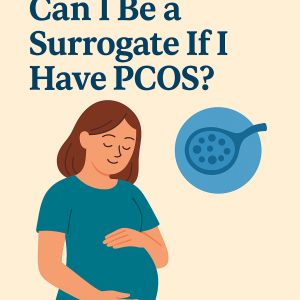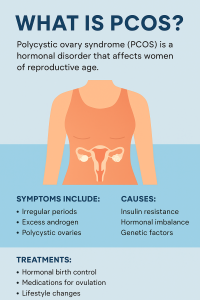
“Can I be a surrogate with PCOS?”
The short answer is: Sometimes — depending on how PCOS has affected your fertility and pregnancy history.
At Los Angeles Surrogacy, we work with many women who have polycystic ovary syndrome (PCOS). While the condition may impact fertility, it doesn’t automatically disqualify you from being a surrogate. If you’ve already carried and delivered a healthy baby of your own, you may still qualify — even with PCOS.
In this detailed guide, we’ll walk you through:
-
Surrogacy eligibility with PCOS
-
Medical and health screening expectations
-
Risks and considerations
-
How PCOS impacts IVF and pregnancy
-
What agencies look for in applicants with PCOS
-
Compensation and support
Let’s explore what you need to know about surrogacy with PCOS and whether you’re a candidate for this life-changing journey.
Can I Be a Surrogate If I Have PCOS?
Yes, many women with PCOS can become surrogates — especially if they’ve had at least one healthy, full-term pregnancy without major complications.
The primary considerations are:
-
Successful pregnancy history
-
Hormonal balance
-
Uterine health
-
Ability to pass medical screening
If your PCOS symptoms are mild or well-managed and you’ve had a complication-free pregnancy, you may be approved.
What Is PCOS?
Polycystic ovary syndrome (PCOS) is a hormonal disorder that affects how the ovaries function. It often causes:
-
Irregular periods
-
Higher androgen (male hormone) levels
-
Polycystic ovaries (multiple immature follicles seen on ultrasound)
-
Infertility due to ovulation issues
-
Insulin resistance or weight gain
It’s one of the most common causes of infertility — but many women with PCOS can and do get pregnant naturally or with help.
PCOS and Surrogacy Eligibility: What Agencies and Doctors Consider
At Los Angeles Surrogacy, we don’t automatically exclude applicants with PCOS. Instead, we review your full reproductive history and current health to determine whether it’s safe and feasible for you to become a surrogate.
We evaluate:
| Factor | Requirement |
|---|---|
| Previous pregnancies | At least one full-term pregnancy with no major complications |
| Menstrual regularity | Stable cycles or ability to undergo hormonal prep for IVF |
| Weight/BMI | Below 33 (as PCOS often affects weight regulation) |
| No gestational diabetes | Or well-controlled if previously diagnosed |
| Normal blood pressure | Especially important if PCOS affects cardiovascular health |
| Healthy uterine lining | Confirmed via ultrasound at a fertility clinic |
| No long-term fertility meds | Showing you can sustain pregnancy without ongoing intervention |
Common Scenarios: Can You Be a Surrogate with PCOS?
✅ You had PCOS but got pregnant and delivered normally
Yes — likely eligible. You’ve demonstrated fertility and uterine health.
❌ You have PCOS and haven’t had a child yet
No — not eligible. All surrogates must have at least one successful pregnancy.
✅ You have mild PCOS symptoms and healthy labs
Yes — especially with a solid OB history. Fertility clinics may accept you.
❌ You have uncontrolled PCOS, irregular periods, or insulin resistance
Maybe not. If your hormones are too unbalanced for IVF prep, you may not pass screening.
Medical Screening for Surrogates with PCOS
Every surrogate undergoes detailed medical screening. With PCOS, your screening may be a little more in-depth.
The screening includes:
-
OB/GYN medical record review
-
Fertility hormone blood tests (FSH, LH, AMH, estrogen, testosterone)
-
Uterine ultrasound to confirm lining thickness and structure
-
Metabolic panels (glucose, insulin levels)
-
Physical exam and BMI check
The fertility doctor will determine whether you’re hormonally ready to undergo embryo transfer, carry a pregnancy, and maintain a healthy environment for the baby.
Can Women With PCOS Have Healthy Pregnancies as Surrogates?
Yes — especially if they’ve had healthy pregnancies before.
In fact, many women with PCOS go on to carry babies with few or no complications once pregnancy is achieved. If you’ve done so already, that’s a good sign for your surrogacy journey.
However, doctors will monitor more closely for:
-
Gestational diabetes
-
Pre-eclampsia
-
Preterm labor
-
Placental complications
The good news is that these risks are manageable, especially with close monitoring and pre-conception planning.
What Are the Health Risks for Surrogates With PCOS?
Like all medical conditions, PCOS carries potential risks that may be relevant to surrogacy.
| Risk | Description |
|---|---|
| Hormonal imbalance | May interfere with IVF medications or embryo transfer success |
| Insulin resistance | Can increase the risk of gestational diabetes |
| Higher miscarriage risk | Especially if not stabilized hormonally before pregnancy |
| Preterm birth | Slightly higher in some studies for women with PCOS |
| Endometrial issues | Some PCOS cases involve thin or overly thick uterine lining |
That’s why a full medical workup is necessary before proceeding.
Does PCOS Disqualify Me From Surrogacy Automatically?
No. Unlike conditions like preeclampsia or uncontrolled diabetes, PCOS does not automatically disqualify a woman from being a surrogate.
Your ability to be a surrogate depends on:
-
How your PCOS presents
-
How well it’s managed
-
What your pregnancy history shows
-
How your uterus responds to hormonal protocols
PCOS and IVF: How It Impacts the Surrogacy Process
Most surrogates undergo hormonal preparation for embryo transfer. This involves estrogen and progesterone — and sometimes Lupron — to prepare the uterine lining.
With PCOS, your body may be sensitive to these medications, or you may respond too quickly or slowly. This can lead to:
-
Cycle cancellation
-
OHSS (Ovarian Hyperstimulation Syndrome) if not managed carefully
-
Changes in timing of the transfer
Fertility doctors experienced in PCOS know how to adjust dosages and prep protocols. We only work with top IVF clinics who understand how to handle these scenarios.
What Do Surrogacy Agencies Require for Women With PCOS?
At Los Angeles Surrogacy, we require that women with PCOS:
-
Have previously delivered a healthy baby
-
Are not on long-term hormonal treatment
-
Maintain a stable BMI under 33
-
Submit clear OB records
-
Pass medical and psychological screening
-
Are not currently undergoing fertility treatment for themselves
We’ll work with your doctors to determine your PCOS and surrogacy eligibility — and we’ll never put you in a position that risks your health.
How Does PCOS Affect Surrogate Compensation?
It doesn’t.
If you’re approved to become a surrogate, you’ll receive the same full compensation as any other surrogate — regardless of your PCOS status.
California surrogate compensation typically includes:
| Category | Amount |
|---|---|
| Base Pay | $50,000–$75,000 |
| Monthly Allowance | $200–$300/month |
| Transfer Fee | $1,000–$1,500 |
| Maternity Clothing | $500+ |
| C-Section Bonus | $2,500 |
| Lost Wages | Based on job and state laws |
All medical expenses, IVF fees, medications, travel, legal, and insurance costs are covered by the intended parents.
Key Takeaways
✅ Yes, you may be able to become a surrogate with PCOS if you’ve had a healthy pregnancy in the past and your condition is well-managed.
✅ Medical screening is required to confirm uterine health, hormone balance, and pregnancy readiness.
✅ Not all PCOS cases are the same. Women with severe hormonal imbalances or fertility medication dependence may not qualify.
✅ Fertility doctors will customize IVF prep for PCOS surrogates to avoid overstimulation and complications.
✅ Compensation remains the same for approved surrogates — regardless of PCOS diagnosis.
Frequently Asked Questions (FAQs)
Can I become a surrogate with PCOS if I’ve never been pregnant?
No. All surrogates must have carried at least one healthy pregnancy and delivery to be considered.
Will having irregular periods from PCOS disqualify me?
Not automatically. Many women with PCOS are able to regulate their cycles with medication during IVF.
How does PCOS affect the embryo transfer?
Your response to hormones may vary. Monitoring and dose adjustments help ensure successful transfer and pregnancy.
Can I still qualify if I had PCOS but no symptoms for years?
Yes. If you’re asymptomatic and had a healthy pregnancy before, you’re likely a good candidate.
Ready to See If You Qualify?
If you have PCOS and are curious whether you can become a surrogate, Los Angeles Surrogacy can help you find out.
Call us at 800-204-7129
Or fill out a confidential application at LosAngelesSurrogacy.com
You might be exactly who someone’s been waiting for.

